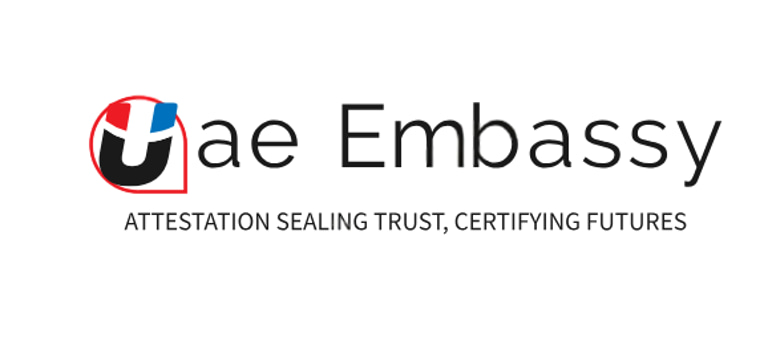Top Egypt Embassy Attestation Guide 2025
Discover everything you need to know about Egypt embassy attestation in 2025. Our comprehensive guide covers legal document attestation processes, requirements, and tips to ensure your documents are properly authenticated.
11/22/20257 min read


Introduction to Embassy Attestation
Embassy attestation is an essential process that involves the validation of documents by a country's embassy or consulate. This official endorsement affirms that the documents in question, such as educational certificates, marriage licenses, and legal papers, are authentic and meet the legal requirements of the destination country. In the context of Egypt, embassy attestation plays a pivotal role in ensuring that expatriates, students, and travelers can present their documentation in a manner that is recognized and accepted by the Egyptian authorities.
The importance of embassy attestation cannot be overstated, as it serves multiple purposes. For expatriates who wish to live or work in Egypt, having their documentation duly attested minimizes the risk of complications when dealing with local bureaucracy. It allows them to establish legal residency or comply with workplace regulations seamlessly. Similarly, students intending to pursue higher education in Egypt must have their academic credentials validated to gain admission to universities. This process ensures that their qualifications are acknowledged, preventing any impediments to their academic aspirations.
Furthermore, travelers who are planning to conduct business or enter into legal agreements in Egypt also require embassy attestation for relevant documents. Without this validation, their papers may be deemed invalid, potentially leading to misunderstandings or legal disputes. Overall, the process of embassy attestation is a critical step that signifies a commitment to upholding legal standards, thereby facilitating smoother interactions between foreign nationals and the Egyptian legal system.
In summary, understanding the significance of embassy attestation is crucial for anyone looking to engage in activities in Egypt. Whether it is for moving, studying, or conducting business, having properly attested documents ensures a more efficient and legally compliant experience in the country.
Types of Documents That Require Attestation
Embassy attestation is an essential process for validating various documents, particularly for individuals navigating international legal and bureaucratic landscapes. In the context of the Egyptian embassy, certain types of documents universally necessitate authentication to ensure their recognition in Egypt and assist in various transactions. These documents typically include educational certificates, marriage certificates, birth certificates, and legal documents.
Educational certificates, such as diplomas or degrees, require attestation to verify the legitimacy of the educational institution and the qualifications acquired. This verification is crucial for individuals seeking employment, further studies, or professional licensing in Egypt. Employers and educational bodies often mandate proof of authenticity to prevent fraud, making attestation a key step in transitioning into the Egyptian workforce or educational systems.
Marriage and birth certificates also fall under the purview of required documents needing attestation. For couples looking to establish residency in Egypt or intending to register their marriage with local authorities, a legitimate marriage certificate is paramount. Similarly, a birth certificate attested by the Egyptian embassy is essential for various purposes, including enrolling children in schools or applying for travel documents. The authentication of these vital records serves to confirm their legitimacy and helps avoid potential legal embroilments.
Legal documents, such as contracts and agreements, require embassy attestation to ensure their enforceability in Egypt. This process facilitates the acceptance of legal papers by Egyptian judicial and administrative authorities, aiding individuals and businesses in navigating legal obligations and rights within the country. Overall, understanding the types of documents that require Egyptian embassy attestation is crucial, as it directly influences individuals' legal standings and travel plans, ensuring they meet all necessary requirements for a smooth experience in Egypt.
Step-by-Step Guide to the Attestation Process
Obtaining an attestation from the Egyptian embassy involves a series of systematic steps that ensure your documents are legitimate and recognized. The process begins with the initial document collection, where it is vital to gather all necessary paperwork. Commonly required documents may include birth certificates, marriage certificates, academic degrees, and other legal documents that require verification. Ensure that the documents are complete and accurate to mitigate delays in the process.
Once you have your documents ready, the next step involves notarization. This generally requires a certified notary public to authenticate the signatures on your documents, thus adding a layer of credibility. Select a notary who is experienced in handling documents intended for international use, as they will be familiar with the specific requirements set by the Egyptian embassy. It is advisable to request copies of the notarized documents for your records.
After notarization, the legalization by relevant authorities comes into play. This step varies depending on your location and the document type but typically involves submission to the local government office or a ministry that specializes in document verification. For academic qualifications, this may mean approaching the Ministry of Education, while personal documents might require verification from the Ministry of Foreign Affairs. Ensure you understand any specific requirements or fees associated with this step.
The culmination of this process is the submission of your documents to the Egyptian embassy for attestation. It is important to follow the embassy’s specific submission guidelines to ensure a smooth process. Before submission, double-check that all documents are in order and clearly labeled with any specific information required by the embassy. Additionally, be aware of the processing times and keep communication lines open with the embassy for any updates. By following these steps and being diligent in your preparation, you can successfully navigate the attestation process with greater ease.
Documentation Requirements for Attestation
When seeking to obtain attestation at the Egyptian embassy, it is crucial to be well-prepared with the necessary documents. The requirements can vary depending on the type of document being attested, but generally, there is a standard checklist to ensure a smooth process. One of the primary requisites includes valid identification documents. This typically refers to a passport or a national identification card, which serves to verify the identity of the individual seeking attestation.
Original certificates are also essential for the attestation process. These may include educational credentials like degrees or diplomas, civil status documents such as marriage or birth certificates, and even medical certificates when relevant. Each type of document may have specific prerequisites; for instance, educational documents may require prior verification from the issuing educational institution before they can be presented to the embassy.
Additionally, applicants should consider providing photocopies of all submitted documents, as embassies often retain copies for their records. Alongside identification and original documents, individuals may need to fill out specific forms provided by the embassy, detailing the purpose of the attestation. This could relate to employment, further education, or personal matters, which helps the embassy process requests more efficiently.
In some cases, applicants may also be requested to present proof of residency, especially if the attestation is being sought from a country outside Egypt. It is advisable to verify the specific documentation requirements on the official website of the Egyptian embassy, as updates and changes may occur periodically. Being comprehensively prepared can significantly expedite the attestation process and ensure compliance with all embassy guidelines.
Processing Time and Fees
Embassy attestation is a crucial step for individuals seeking to validate their documents for use in foreign nations, particularly when dealing with the Egypt embassy. The processing time for attestation can significantly vary based on several factors, primarily the type of document being processed and the current workload of the embassy. Generally, the attestation process can take anywhere from a few days to several weeks. Standard documents such as birth certificates, marriage certificates, and academic qualifications tend to have more predictable processing times, while specialized documents may require additional verification steps, potentially elongating the timeframe.
The fees associated with embassy attestation also fluctuate based on the nature of the document and the specific services required. For instance, obtaining an apostille, a specific form of attestation recognized internationally, may incur different charges when processed through the Egypt embassy as compared to general attestation services. It's important to be aware that additional fees may apply for expedited services, which allow applicants to shorten the processing time significantly. Applicants can opt for these expedited services, especially if they have impending deadlines, such as job placements or university admissions, that require fast-tracked document validation.
Moreover, understanding that each embassy operates with its unique set of regulations is essential. Some embassies might process documents more swiftly or at a lower cost than others, making it beneficial for individuals to research and prepare accordingly. Keeping in mind these variations in processing times and fees can ultimately aid individuals in planning their timeline effectively when seeking embassy attestation.
Common Challenges and How to Overcome Them
The process of Egypt embassy attestation is essential for individuals seeking to validate their documents for use abroad. However, applicants often encounter several challenges during this process that can lead to frustration and delays. Understanding these common issues and knowing how to overcome them can significantly streamline the attestation experience.
One prevalent challenge is document rejections. Embassy staff meticulously scrutinize submitted documents for compliance with specific guidelines. Common reasons for rejection include incorrect information, improper formatting, or expired documents. To mitigate this risk, applicants should thoroughly examine all documents for accuracy and validity prior to submission. Ensuring that all necessary documentation, such as original certificates and translations if required, is complete and in order can significantly reduce the chances of encountering this issue.
Additionally, delays in processing times are frequently reported. Factors contributing to delays can range from high volumes of applications to administrative bottlenecks within the embassy. To counter these delays, applicants are encouraged to apply well in advance of any deadlines. Keeping open lines of communication with the embassy can also provide clarity on processing timelines and any additional requirements that may arise during the attestation process.
Misunderstandings between applicants and embassy personnel can further complicate the attestation experience. Language barriers or cultural differences might lead to miscommunication regarding specific requirements or procedures. To overcome this challenge, individuals could consider seeking assistance from professionals who specialize in embassy services. These experts can provide valuable insights, translate communications, and facilitate smoother interactions with embassy staff.
In conclusion, by anticipating these challenges and preparing accordingly, individuals can navigate the Egypt embassy attestation process more effectively, ensuring a smoother and more efficient experience.
Future of Embassy Attestation in Egypt
The landscape of embassy attestation services in Egypt is poised for significant changes in the coming years, particularly as we approach 2025. As globalization continues to influence various sectors, it is essential to consider how these trends might reshape the attestation process. One of the foremost trends anticipated is the increasing integration of technology into the application procedures. Digital platforms are already emerging as essential tools for enhancing efficiency and accessibility in myriad governmental services, and embassy attestation is likely to follow suit.
In the near future, applicants may expect streamlined online application systems that reduce processing times and improve transparency throughout the attestation process. This may include the implementation of secure platforms where individuals can submit documentation digitally, track the status of their applications in real-time, and receive notifications upon completion. Such advancements would not only provide convenience for applicants but also optimize resource allocation within embassies and consulates.
Moreover, evolving travel regulations, catalyzed by health and security concerns, might affect the requirements for document attestation. Policymakers in Egypt are likely to adapt their processes to align with international standards while enhancing safety protocols. This adaptability may lead to standardization in attestation practices, reducing discrepancies between different embassies and facilitating smoother international mobility for Egyptian citizens and foreign nationals alike.
Looking ahead, it is essential for stakeholders, including applicants, legal professionals, and government authorities, to remain informed about potential reforms. In conclusion, the future of embassy attestation in Egypt is expected to be influenced significantly by technological advancements and changing regulatory landscapes, promising a more efficient and user-friendly experience in the near future.
